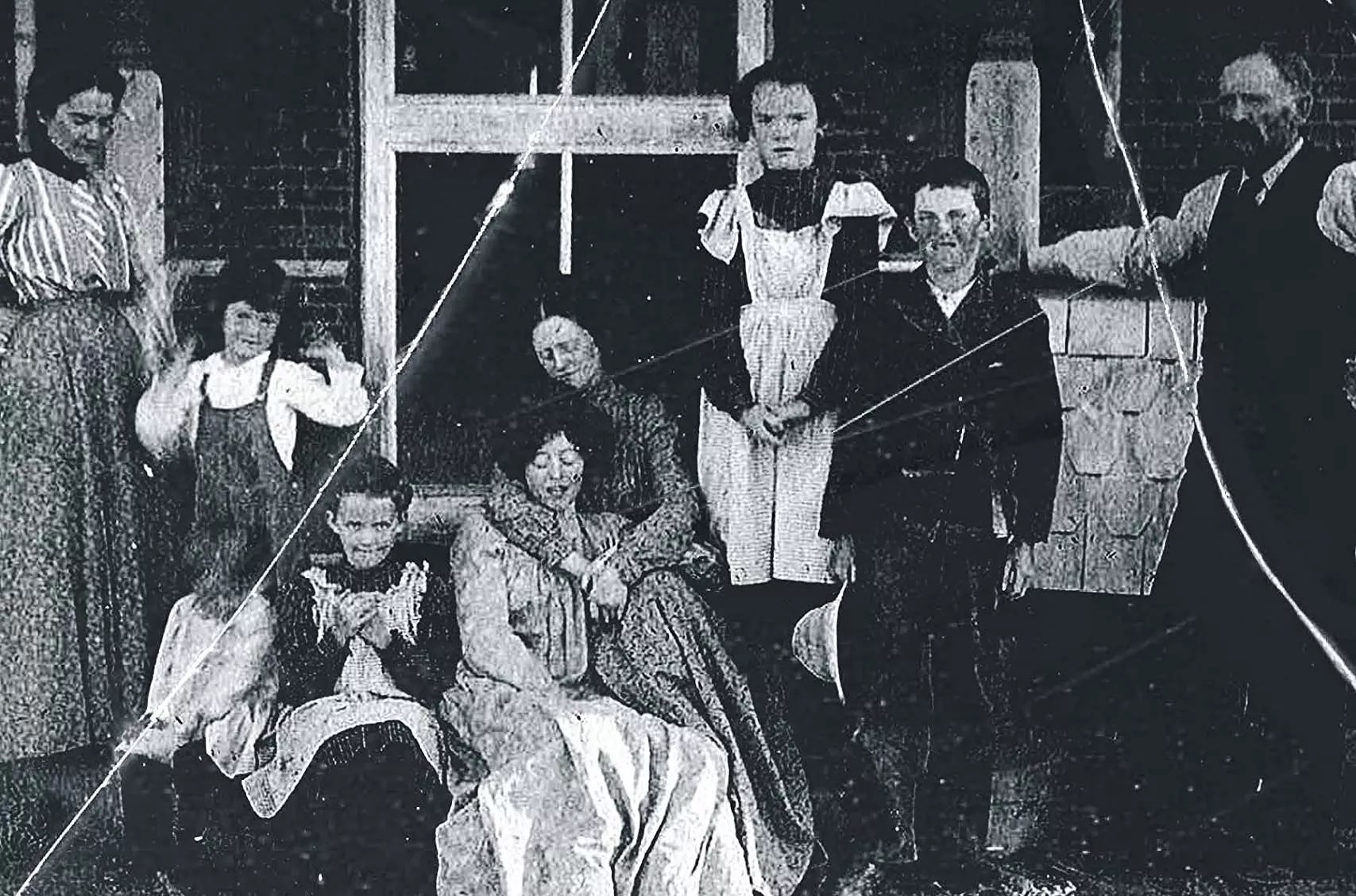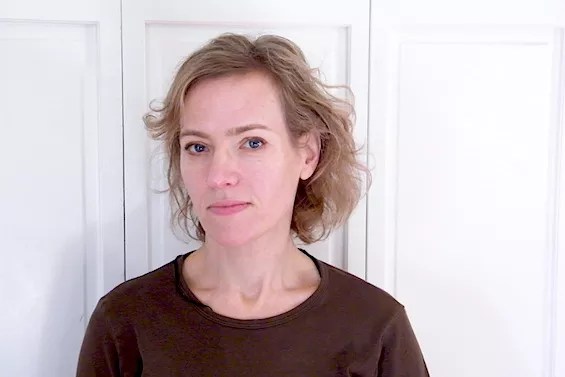
University of Nebraska Press

Audio By Carbonatix
Author, poet, professor, publisher and activist Julie Carr leads a quiet yet dynamic life in Denver. Quick to protest in the interest of social justice as well as bring community together at Counterpath, the east Denver small-press publisher, exhibition space and meeting place, Carr views the world with keen intelligence. And she’s laying those views out with an impeccable, detailed literary style in her new book.
She spent five years writing and researching Mud, Blood and Ghosts: Populism, Eugenics and Spiritualism in the American West, which interweaves a startling page of family history gleaned from her populist great-grandfather Omer Madison Kem’s diaries with a more accurate account of American history’s darker side. Carr will host a local book launch for Mud, Blood and Ghosts at Counterpath on Saturday, May 13.
We asked Carr to tell us more about her treatise on how racism and the nation’s white capitalist spirit encouraged slavery, death, displacement and poverty among Black and Indigenous communities for the cause of Manifest Destiny. The book, which also covers the roots of current water wars in the West and the populist movement’s kinder agendas of support for the working class and the women’s movement, offers a wealth of insight. Keep reading for more about Carr and what she uncovered.
Westword: What spurred your interest in researching your ancestor Omer Kem?
Julie Carr: There are three different things. One, Trump got elected. I’ve noticed that a lot of books released lately start with a preface that Trump is being elected, which prompted people to ask questions. The second thing is: What is populism? I knew Kem was a populist, but what’s happening now is not the kind he was involved in. I wanted to learn what was distinct about it in his time. Also, Standing Rock made me go deeply into understanding the settler populists and the colonization of Indigenous land.
And third: the fact that this archive – a 2,000-page autobiography written by Kem – existed. My brother established that it was at the Creighton University Reinert Alumni Memorial Library, but nobody in the family had read it.
How much did you know about him before you unearthed his writings?
I knew certain things: that he was a populist, an agrarian party representative in Congress and a spiritualist who practiced seances. I knew where he had lived. I didn’t know about the eugenics, which took over the last three decades of his life. There’s something about the way families curate around the stories of ancestors. My father didn’t know, either, and the only people who would have silenced it were Omer’s children.
I didn’t know much about the diaries, but I knew they existed. I reached out to Creighton, and a whole drama happened around it.
I left a message for the librarian on voicemail, and he called back after working hours, speaking in obscure terms.
He said, ‘I don’t know that I can talk with you about them.’ It turned out that my cousin Chris Christensen had gotten into an email battle with him about the materials, which were caught up in a legal issue. The librarian said Chris was angry, but Chris is not like that at all.

Julie Carr hopes for a better future while digging up the history of her great-grandfather Omer Kem’s populist views and support for eugenics.
Courtesy of Julie Carr
Was it always your plan to wrap a more just, alternative American history around his story, or did that happen later?
I never wanted to write a biography or family history. That’s not interesting enough, and I didn’t think it was true enough because of the way individual stories are wrapped around and encircled by other stories. Each of us has an independent path, following politics, trends and huge events we are influenced by. I was interested in the ways we hurt or help people unknowingly.
I began to draw bigger circles around the stories. In each chapter about what happened to him, political events were connecting and overlapping, and I was learning about these deep pockets of history.
I had the basic knowledge about Reconstruction, the West, spiritualism and World War One, but I’m not a historian. I hadn’t read a lot of historian’s books beyond how the textbooks or journalism – and even poets – approach the history. My study of the genre was really interesting. It was revelatory about the American history of Native dispossession. It was hard to know much about what happened – there were so many different stages, complicated and multiple, and being able to immerse myself in that history was really important. I live in Colorado, so I began learning about the removal of Ute people, to track that from the beginning to the end. It felt like I was understanding the state in a whole new way.
Another thing was the essence of scale while writing about the late nineteenth or early twentieth century. It no longer feels like it was that long ago. Reading so many primary writings made me feel closer to those eras and decades.
That makes me feel more committed to thinking and acting on a basis of paying attention to different kinds of inequality and suffering that might go on. I’m more committed, but not because I feel more complicit. It makes me feel more committed because I know there are choices. People have stories about when someone with power made something harmful happen, and people who worked against inequalities put lives on the line. There are also stories of people going along, keeping the status quo.
Knowing many different stories, I can see exactly how a person could have gone and done what they chose to do. We have to be hyper-conscious and educated. It’s an opportunity to do something helpful versus an opportunity to not do anything.
What is your ethical takeaway?
Kem’s friend and fellow homesteader, Jim Ream, who took an opposite path, had beautiful ethics about how we should live our lives, writing, “Be active and aware of every opportunity in the moment to decide,” in correspondence. I look at history and think that things went a certain way inevitably, that things just happened because they had to have happened that way. But you see that’s not true. There is a choice.
Now that it’s all said and done, how do you feel about the result? Have you come to terms with these roots, or are you still searching?
Looking at Kem, and the eugenics, the racism that accompanies ableism and other injustices that come along with the eugenics point of view, it’s important for the whole family to know-and this is a dominant point – the importance of querying our own selves. Are we thinking some people are more worthy than others? Anybody could fall into that. For instance, the idea that people unhoused aren’t exactly people anymore. We let the idea seep in.
Getting involved in someone’s voice and narrative is something that you don’t forget once you know it. It deepens self-awareness. And the widening of the lens gives a bigger sense of what is true, so I’m definitely still searching.
One thing I mention in the book is the irony of being on one side Jewish and settler family on the other side, and the way eugenics and Jim Crow were influential on Nazi politics, as Nazis writing the Nuremberg laws were consulting us on laws for sterilization and so forth. White progressive elites tend to see themselves as always on the right side, but what we have to ask now is: What are the stories underneath the stories? What mistakes were made, what are the complexities involved?
It isn’t ever as simple as one side is the perpetrator and the other isn’t. Never make such simplistic claims. Most of us carry contentious histories in our blood, like that of slave versus slaver. What I’m interested in and studying now is how the Jewish left (Emma Goldman, for example) and the Industrial Workers of the World labor movement evolved. Populists were once on the left, essentially, and they did have some very good ideas that are now law.”
Julie Carr’s Book Launch and Party happens Saturday, May 13, 7 p.m., Counterpath, 7935 East 14th Avenue. The event includes music by Benjamin Roberts, a film screening by poet Carolina Ebeid, and cake and dancing in the garden. Admission is free.